9. Continually reflect on and improve practice through an understanding of the impact of one’s values, beliefs, attitudes and behaviour on children, families and communities.
Continually reflect on and improve practice through an understanding of the impact of one’s values, beliefs, attitudes and behaviour on children , families, and communities.
Throughout the “Empowering Pedagogy for Early Childhood Education” text book written by Beverlie Dietze and Diane Kashin they provide opportunities for a reader to engage in “reflective moments” to key messages in their text, insert opening quotations to engage the reader in thinking, display programming bubbles to engage connection, and add reflection questions for self learning to allow the reader to ponder and reflect. I have found this text book to be a great resource tool and I know it will continue to be a tool I use consistently to help me to improve my reflection process and improvement process in regards to my professional practices within my centre.
It is important to know who you are as an educator and to be real to yourself and others as I believe one’s/my values, beliefs, attitudes, and behaviour greatly impact our children, families, community members, and staff.
As I feel strongly about my professional and ethical practice as an educator, I know it is in the best interest for me, my children, their families, community members and staff, for me to stay open minded with my values “a deeply rooted belief about a concept’s inherent worth” (Adler.R.B., Rodman. G. & Sevigny. A. 2019. p. 438), and beliefs “an underlying conviction about the truth of an idea, often based on cultural training” (Adler.R.B., Rodman. G. & Sevigny. A. 2019. p. 438), as we embrace many diverse cultures surrounding us. There may be times I may not agree with one’s values and/or beliefs and vice versa and that is ok. However being respectful to one another’s values and beliefs will guide and help us with decision making, problem solving and/or resolve conflict situations. To stay “focused on ground rules that are based on the core values of democracy: be safe (don’t unreasonably cause harm to oneself or others), be respectful (respect the rights, beliefs, and possessions of others), and be responsible (don’t unreasonably damage shared property or the natural environment)” (Miller. D. F. 2013. p. 146), is important also. A democratic society encourages the values of cooperation, fairness and justice into the hearts of our young children.
One’s values and beliefs are closely interrelated deeply in their consciousness and one’s attitude and behaviour lies closer to the surface. How one expresses their attitude, “a predisposition to respond to an idea, person, or thing favorably or unfavorably” (Adler.R.B., Rodman. G. & Sevigny. A. 2019. p. 438), and behavior “the way in which one acts or conducts oneself, especially toward others”, plays a key role in how others hear, see and connect to one. When working in an environment with young children it is important to provide a calm, positive and balanced manner to allow the children to experience appropriate attitude and behaviour from their educators. Creating a trusting, safe, caring, healthy, warm, secure and respectful environment enhances connection and understanding of one another in a supportive and positive atmosphere.
When I feel my values, beliefs, and attitude and or behaviour, mental, emotional and physical efforts are not in balanced it is an indicator to reflect. Continuing to reflect on my values and beliefs my attitude and behaviour consistently, allows me time to view my own bias and opinions, to rethink, re-evaluate and redefine my values and beliefs. I can take action to research, to collaborative to help answer important questions that come up. Engage in the process of discussions, discourse, knowledge, and to think critically. Allowing my professional landscape to change, grow and develop, to stay in tune and be real to myself and others, to think deeper, and to have clearer visions of my values and beliefs creates a positive impact for me, my children, their families, and community and staff members. Being aware of my own professional responsibilities opens the door to become a successful educator.
When I “can ponder the question of who, what, when, where, how, and why in relation to reflective practice” (Dietze.B., & Kashin.D. 2019. p. 469), the W5 & How, I know I am engaging in reflective practice.
J.P.B.

Examples of Documents: Direct
Below are some examples of wall posters in our centre.
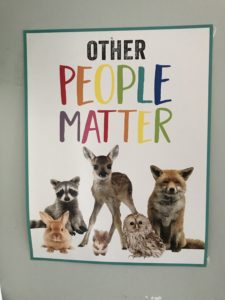
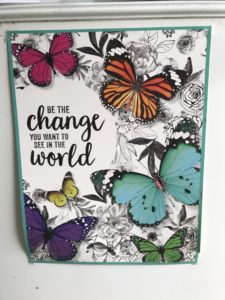
Below I share with you my Johari Window. A clear reflection of who I am, my values, beliefs and attitudes and dreams.
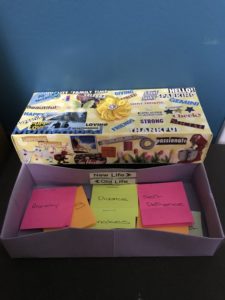
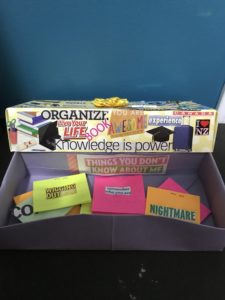
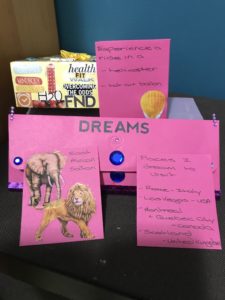
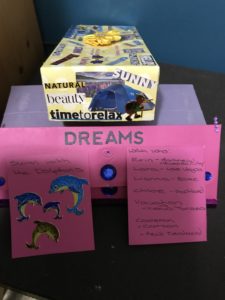
ECC 157 Self Reflection, Johari Window Assignment
ECC 163 Personal Connections and Reflections 2019
ECC 136 Philosophy Building Blocks Welcome to our Centre Poster
ECC 136 Personal Philosophy Assignment
Examples of Documents: Indirect
Licensing Officer Stephen Morgan Letter August 2020
Employer Letter Linda Watson August 2020
Parent and Co-worker letter Jenna Phipps August 2020
References
Adler.R.B., Rodman. G. & Sevigny. A. 2019. Understanding Human Communication. Fourth Canadian Edition. Don Mill, Ontario. Oxford University Press.
Dietze. B. & Kashin. D. 2016. Empowering Pedagogy for Early Childhood Education. Don Mills, Ontario. Pearson Canada Inc.
(Dietze.B., & Kashin.D. 2019. Playing and Learning in Early Childhood Education. Second Edition. North York, Ontario. Pearson Canada Inc.
Miller. D. F. 2013. Positive Child Guidance. Belmont, CA. USA. Wadsworth, Cengage Learning.
Study.com 2020. Self-reflection image. Retrieved from https://study.com/academy/lesson/self-reflection-in-childhood-definition-strategies.html